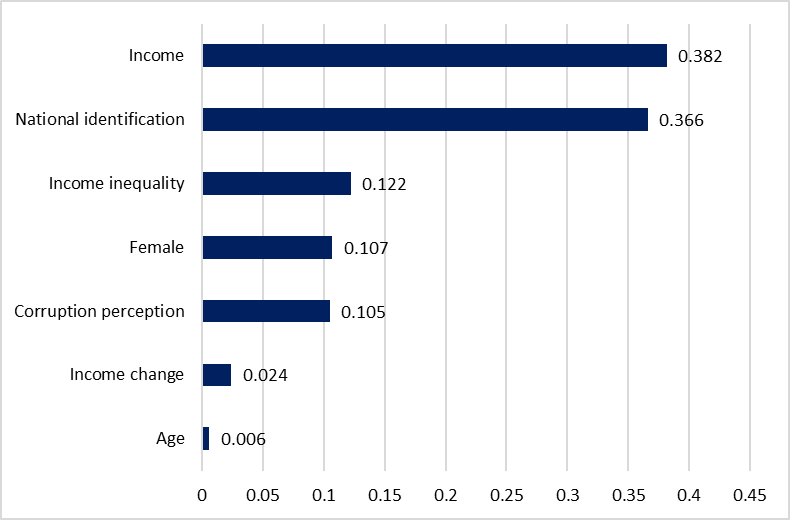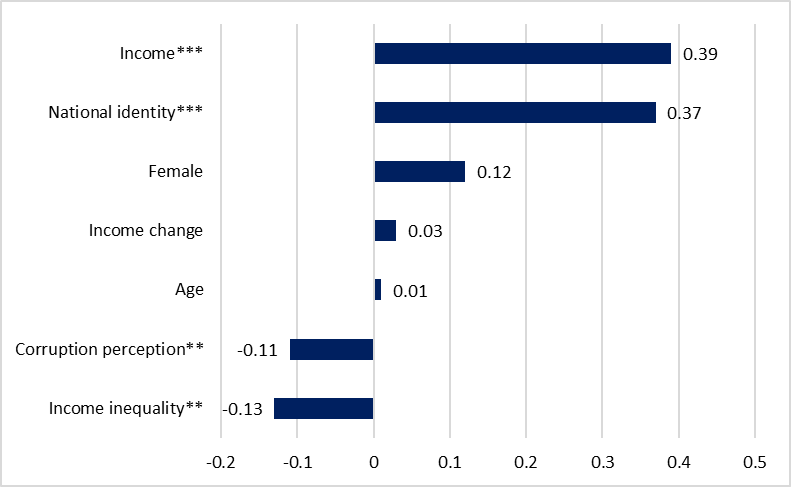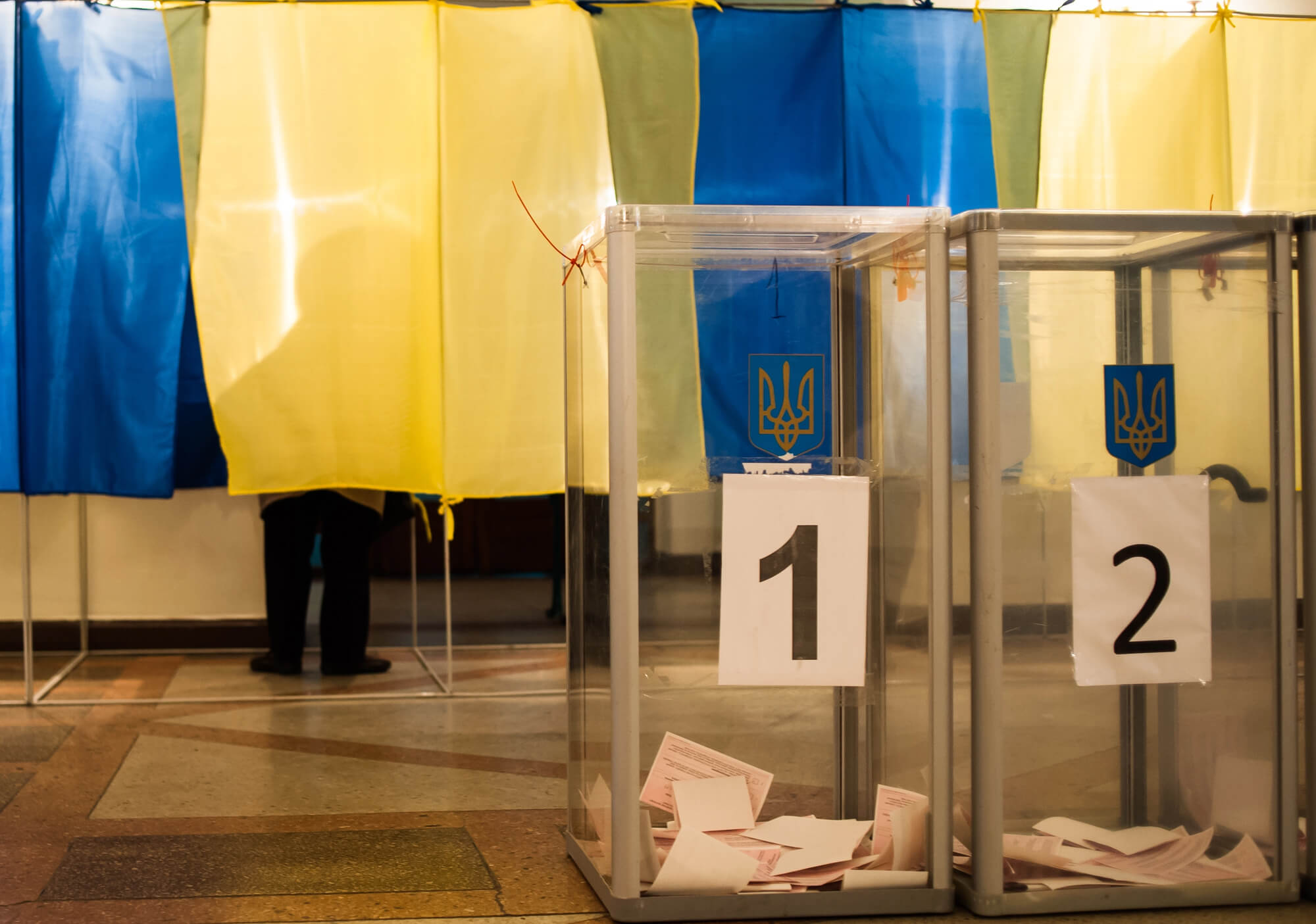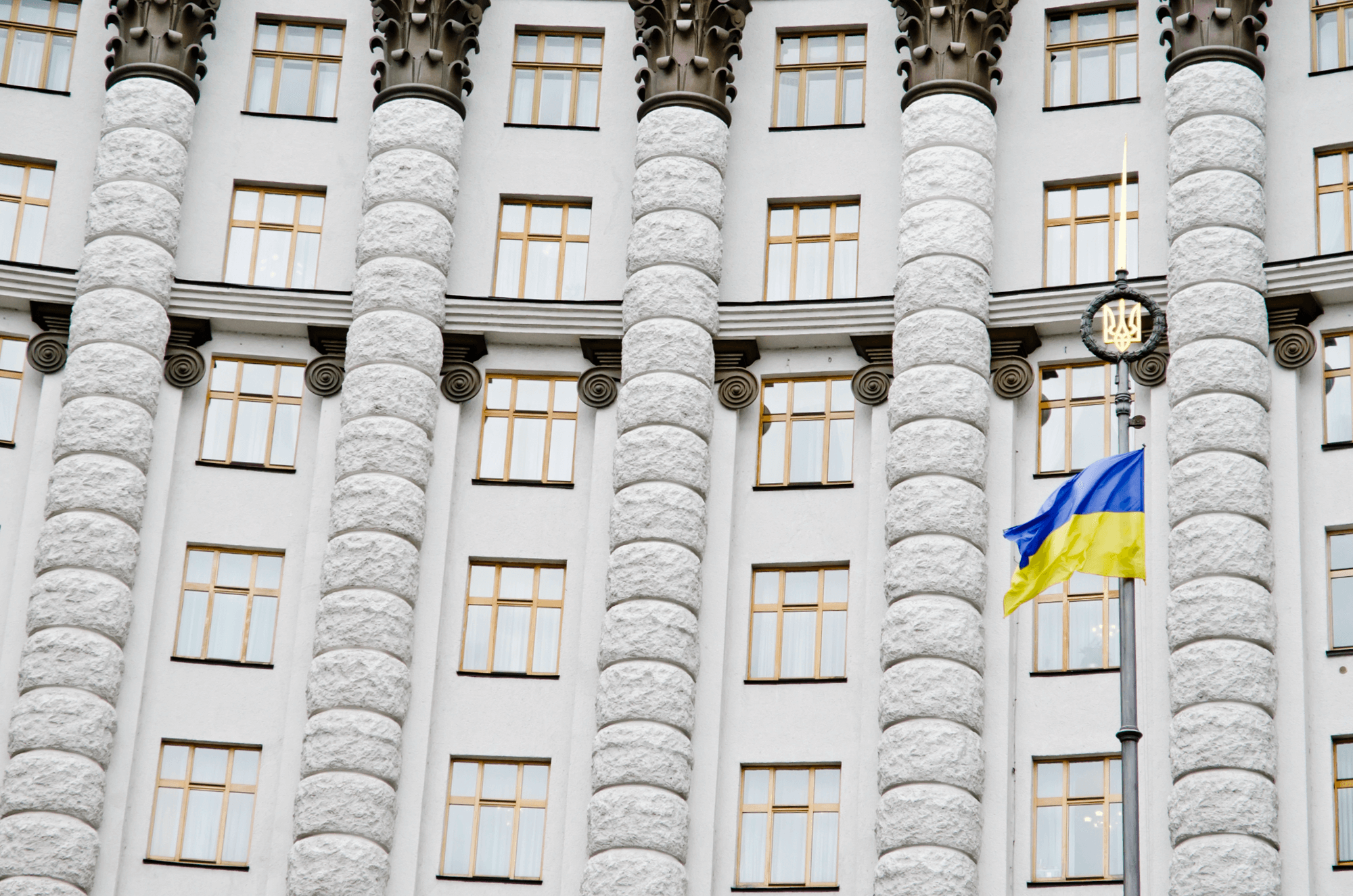This study examines how the ongoing conflict in Ukraine may influence the importance of preserving democracy for Ukrainians. We estimate three potential channels for the negative impact of war on the importance of democracy: declines in the average monthly household income, rising perceived income inequality, and perceptions of corruption. However, a greater sense of national identity driven by a rally-around-the-flag effect is likely to offset some of these adverse consequences.
Ukraine’s ongoing war is often framed not only as a struggle for the country’s independence and territorial unity but also as a fight to preserve democratic governance. Paradoxically, this very fight can produce multiple consequences that negatively affect democratic attitudes among the population.
According to the literature on cultural evolution and change, attitudes are shaped early in life through socialization processes. However, they tend to undergo substantial transformation during the life course as a result of personal experiences. Many of these experiential factors become particularly salient during the war, such as income losses, rising poverty, worsening perceptions of income inequality and corruption. These negative consequences of conflict carry substantial risks of weakening democratic attitudes in Ukraine.
More specifically, studies show that the value of self-expression and autonomy, which underpins democratic attitudes, can only flourish when basic needs are met. In other words, individuals require sufficient income to demand or appreciate democracy. In contrast, low income encourages more traditional and materialist perspectives, which usually support the development of authoritarian attitudes. Therefore, by reducing income or causing complete income loss, conflict may diminish the importance individuals place on democracy.
In addition to income levels, perceptions of income inequality shape attitudes toward democracy. Rising income inequality weakens interactions between different social groups, creating social distance and reducing cross-class contact. This, in turn, hampers the development of a shared collective consciousness and a common understanding of democratic values. Conflict inevitably exacerbates income inequality and, hence, can be expected to foster more authoritarian attitudes among the population.
Finally, corruption can create perceptions of unfairness and injustice, often leading individuals to adopt more traditional or authoritarian views. Conflict places immense strain on government institutions, undermining public confidence in the state’s ability to uphold justice. Consequently, perceptions of corruption typically increase during conflict, eroding positive attitudes toward democracy within society.
At the same time, scholars acknowledge that conflict can foster unity in beliefs and opinions among the population, typically through a rally-around-the-flag effect. The threat to existential security encourages individuals to cooperate and align their values in order to survive as a nation. However, this effect may not necessarily extend to democratic attitudes in the case of Ukraine, where the issue of democracy has taken a secondary role, overshadowed by the fight for national survival.
Building on the arguments above, this study investigates whether—and in what ways—Russia’s invasion of Ukraine has affected how much importance Ukrainians place on preserving democracy. The analysis draws on data collected by the author through an online survey conducted between November 2024 and April 2025 (the details of the survey design are provided here).
In this analysis, the outcome variable is responses to a standard question about the importance of preserving democracy in Ukraine, measured on a binary scale (0 = “Not important” and 1 = “Important”). Variations in these responses are analyzed in relation to several predictors: personal income level (1 = “Less than 5,000 hryvnas” to 5 = “More than 50,000 hryvnias” per month), changes in household income since 2022 (1 = “Complete loss of income” to 11 = “Increase in income”), individual perception of income inequality (1 = “No income inequality at all” to 7 = “High income inequality”), perceptions of corruption (1 = “No corruption at all” to 7 = “Complete corruption”), national identification (1 = “I do not feel part of the Ukrainian nation” to 7 = “I strongly feel part of the Ukrainian nation”), as well as respondents’ age and gender (0 = “Male,” 1 = “Female”).
The dataset has 1,125 observations. Seventy percent of these were randomly assigned to the training set, while the remaining 30 percent were used to test the final model. Because the training data were imbalanced—with approximately 69 percent positive responses—the SMOTE technique was used to generate synthetic observations for the minority class, ensuring a more balanced distribution.
Analytical method
The analysis utilized the logistic regression algorithm within a machine learning framework. Its key advantage is that it produces directly interpretable coefficients, facilitating an understanding of the influence of each predictor on the outcome. The model was further tuned using a regularized approach with glmnet, optimizing both the penalty (regularization strength) and mixture (L1 vs L2 ratio) hyperparameters. A grid of candidate values was evaluated through cross-validation on the training data, using the ROC (Receiver Operating Characteristic) AUC (Area Under the Curve) metric to select the best-performing combination. This approach helped prevent overfitting while maintaining predictive accuracy. The best-performing combination of hyperparameters was then used to produce the final model. Estimations were performed in the tidymodels package in R.
The predictive performance of the estimated model exceeds the commonly acceptable threshold of 0.70. In particular, the accuracy score reached the value of 0.787 (the model correctly predicts about 79% of all cases). Figure 1 presents the results of the permutation importance analysis by estimating the drop in model performance when one of the selected variables is randomly shuffled. Random shuffling means that for the variable being tested, its values are mixed up across all the data points, breaking any real relationship between the variable and the target outcome.
Figure 1 suggests that the national identification variable and income have the highest permutation importance score (around 0.4). These two variables contribute most strongly to the model’s predictions. Corruption perception, income inequality and gender follow with a score of about 0.1, indicating a smaller but still meaningful influence. In contrast, income changes since 2022 and respondents’ age play a negligible role in predicting the importance of democracy among Ukrainians.
Figure 1: The permutation-based variable importance plot

Note: The figure presents a permutation-based variable importance plot, where the length of each bar reflects an increase in prediction error when a specific predictor is shuffled. The method works by shuffling the values of one feature (variable) at a time and measuring the decrease in the model’s predictive performance. If shuffling a feature greatly reduces accuracy that feature is considered important. Permutation importance of 0.40, for instance, means that the corresponding predictor contributes about 40 percentage points of accuracy to the model’s predictive power.
In addition to the permutation analysis, Figure 2 visualizes standardized coefficients and their significance level for each of the selected predictors. Consistent with modernization theory, individuals with higher incomes are more likely to value democracy as an important form of governance for Ukraine. By contrast, lower income tends to reduce the likelihood of viewing democracy as important to preserve in Ukraine. Perceived corruption and income inequality act as negative predictors of the importance attributed to democracy. Ukrainians who have higher corruption perceptions are less likely to consider democracy important. Similarly, perceptions of increasing income inequality reduce the likelihood of valuing democracy.
Figure 2: Standardized coefficients for the key drivers of democracy importance in Ukraine.

Note: Standardized coefficients are displayed on the bars. In this analysis the response variable is the importance of preserving democracy in Ukraine measured on a binary scale (0 = “Not important” and 1 = “Important”). The only significant predictors in this model are Income, National identification, Corruption perception, and Income inequality. The following values are used for indicating the predictors’ significance level: *** p<0.01, ** p<0.05, * p<0.10.
The above findings suggest that if the war leads to income reductions, worsening corruption, or wider income gaps, democratic attitudes within Ukrainian society may deteriorate. This trend could have serious consequences for the country’s democratic development. Placing lower importance on democracy may result in reduced political participation, limited electoral turnover, and greater influence of voters with authoritarian preferences. Such developments likely diminish overall demand for democratic governance and can undermine ongoing efforts to establish truly democratic foundations to convince the EU that Ukraine deserves full membership in the near future.
Nonetheless, the ongoing war has led to a marked increase in national identification. Our results suggest that respondents who strongly identify with the Ukrainian nation are more likely to assign greater importance to preserving democracy. In fact, national identification appears to be a dominant factor shaping perceptions of democracy’s importance in Ukraine (see Figure 1 and Figure 2). This positive trend can be expected to partially offset the negative repercussions of the war.
In summary, even if the ongoing war for independence also aims to defend Ukrainian democracy, it still produces multiple negative consequences that can undermine democratic attitudes among Ukrainians. Consistent with theoretical expectations, declines in income, rising income inequality, and perceptions of high corruption may foster more authoritarian attitudes within society. These trends could weaken the overall democratization process in Ukraine and jeopardize the country’s prospects for rapid accession to the European Union.
Considering these findings, the government should, alongside prioritizing security, pay greater attention to improving the financial well-being of the population, reducing income disparities, and ensuring the impartial functioning of public institutions. While these tasks are particularly challenging under the budgetary constraints imposed by the war, even symbolic measures and relevant political discourses should help mitigate the rise of authoritarian attitudes. Strengthening national identification—through measures such as promoting civic education and inclusive national narratives—may also help alleviate war-related constraints and foster democratic attitudes, as national identification is closely associated with pro-democratic orientations among Ukrainians. Failing to act risks entrenching authoritarian attitudes, which can, in turn, influence the population’s stance regarding the overall geopolitical future of Ukraine.
Photo: depositphotos.com/ua
Attention
The author doesn`t work for, consult to, own shares in or receive funding from any company or organization that would benefit from this article, and have no relevant affiliations



